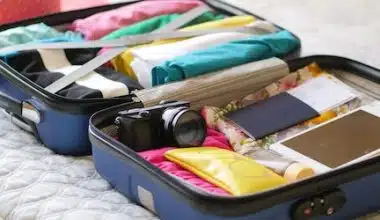Embarking on the journey of starting your travel agency is an exciting and rewarding venture. Starting a travel agency involves lots of processes and these processes are listed here in this writing. In this post, we give a breakdown of how you can apply the steps listed, as these steps help ensure a strong foundation for growth and secure funding for the agency.
How To Start A Travel Agency
Starting a travel agency can be an exciting venture for those passionate about travel and helping others plan their trips.
Here are the steps to get started:
#1. Find your Travel Agency Niche
Determine the specific area of travel you want to focus on, such as luxury travel, adventure travel, or family travel. Finding a niche allows you to build your agency on a strong foundation of your strengths, interests, and personal networks.
#2. Choose your Travel Agency Name
Select a name for your travel agency that is catchy, memorable, and reflects your brand. Make sure to check if the name is available and register it for legal purposes.
#3. Complete Relevant Training
Consider completing relevant training or obtaining certifications in the travel industry. This can provide you with the necessary knowledge and skills to run a successful travel agency.
#4. Create a Business Plan
Develop a comprehensive business plan that outlines your agency’s goals, target market, marketing strategies, and financial projections. A well-thought-out business plan will guide your agency’s growth and help secure funding if needed.
#5. Obtain Necessary Licenses and Permits
Research and obtain any required licenses and permits to operate a travel agency in your jurisdiction. This may include business licenses, seller of travel licenses, or professional certifications.
#6. Set Up your Office
Decide whether you want to operate your travel agency from a physical office or as a home-based business. Consider the costs and benefits of each option and create a comfortable and functional workspace.
#7. Establish Relationships with Travel suppliers
Build relationships with travel suppliers such as airlines, hotels, tour operators, and cruise lines. These partnerships will allow you to offer a wide range of travel options to your clients and negotiate competitive rates.
#8. Develop an Online Presence
Create a professional website for your travel agency that showcases your services, destinations, and contact information. Utilize social media platforms to engage with potential clients and share travel tips and inspiration.
#9. Market your Travel Agency
Implement marketing strategies to promote your travel agency and attract clients. This may include online advertising, content marketing, social media campaigns, and networking with other travel professionals.
#10. Provide Excellent Customer Service
Focus on delivering exceptional customer service to your clients. Respond promptly to inquiries, provide personalized recommendations, and handle any issues or concerns that may arise during the travel planning process.
How To Start A Travel Agency From Home
Starting a travel agency from home involves identifying your niche, choosing a name, obtaining training, negotiating fees and commissions, signing with a host agency, investing in a reservation system, creating a professional online presence, implementing effective marketing strategies, providing excellent customer service, and staying updated with industry changes.
Challenges of Starting a Travel Agency From Home
While starting a travel agency from home offers flexibility and convenience, there are some challenges to consider, such as
#1. Limited Networking Opportunities
Working from home may limit your access to networking opportunities within the travel industry. Building relationships with other travel professionals, suppliers, and industry associations can be more challenging, potentially affecting your ability to gain valuable insights and partnerships.
#2. Lack of Face-to-face Interaction
Without a physical office, you may miss out on the benefits of face-to-face interactions with clients. Some clients may prefer the personal touch and reassurance of meeting in person, which can be harder to provide as a home-based travel agency.
#3. Highly Competitive Online Market
The online market for travel agencies is highly competitive. Standing out among numerous online travel agencies, booking platforms, and travel websites can be difficult. It requires strategic marketing, a strong online presence, and differentiation to attract potential clients.
#4. Managing Financial Aspects
Starting a travel agency from home means handling various financial aspects, such as managing cash flow, tracking expenses, and setting up payment systems. Without dedicated accounting staff, you may need to learn and manage these financial aspects on your own.
#5. Staying Updated with Technology
The travel industry relies heavily on technology, with constant advancements in booking systems, travel apps, and online platforms. Staying up to date with the latest technology trends and tools can be challenging as a home-based agency, especially if you lack IT support or expertise.
#6. Dealing with Legal and Regulatory Requirements
Running a travel agency involves complying with legal and regulatory requirements, including licensing, insurance, and compliance with industry regulations. Navigating these requirements can be complex and time-consuming, particularly if you are not familiar with the legal aspects of the travel industry.
#7. Managing Customer Expectations Remotely
Meeting customer expectations without face-to-face interaction can be challenging. Building trust, effectively communicating travel options, and managing any issues or changes in plans remotely require strong communication skills and attention to detail.
#8. Establishing Credibility
As a home-based travel agency, establishing credibility and gaining the trust of potential clients can be a challenge. Clients may question the legitimacy and professionalism of a home-based business compared to a traditional brick-and-mortar agency.
How To Start A Travel Agency Business
A travel agency must first choose a niche, then create a thorough business plan, get all required training and certifications, decide on a legal structure, secure startup funding, register and obtain licenses, set up an office, cultivate supplier relationships, create a polished online presence, put effective marketing strategies into practice, and deliver first-rate customer service.
A travel agency business offers a range of services to assist individuals, businesses, and organizations in planning and booking their travel arrangements. These services can include:
#1. Travel Management
This involves managing and organizing business travel arrangements, including booking transportation tickets, accommodations, car rentals, and other travel-related services.
#2. Corporate Travel Services
Travel agencies often cater to businesses by providing specialized services tailored to their needs. This can include managing corporate travel policies, ensuring compliance, optimizing booking processes, and offering on-the-go support for business travelers.
#3. Vacation Planning
Travel agencies assist individuals and families in planning and booking their vacations. They provide recommendations for destinations, arrange flights, accommodations, tours, and activities, and offer personalized itineraries to suit their clients’ preferences.
#4. Group Travel
Travel agencies can organize group travel arrangements for various purposes, such as corporate retreats, conferences, school trips, or family reunions. They handle logistics, negotiate group rates, and coordinate travel arrangements for large groups.
#5. Travel Insurance
Many travel agencies offer travel insurance options to protect clients against unforeseen events, such as trip cancellations, medical emergencies, or lost luggage. They guide in selecting the right insurance coverage for their clients’ travel needs.
#6. Destination Weddings and Honeymoons
Travel agencies specializing in destination weddings and honeymoons assist couples in planning and coordinating their special events in exotic locations. They handle all the logistics, including travel arrangements, accommodations, and wedding-related services.
#7. Cruise and Luxury Travel
Some travel agencies focus on cruise vacations or luxury travel experiences. They have expertise in booking cruises, selecting the right cabins, arranging shore excursions, and providing personalized services for clients seeking high-end travel experiences.
#8. Travel Consultation
Travel agencies offer consultation services to provide expert advice and recommendations to clients. They help clients navigate through various travel options, provide insights on destinations, and assist in creating customized travel experiences.
How To Start A Travel Agency Online
To start a successful online travel agency, you must first identify a niche, pick a catchy name, write a business plan, go online, collaborate with suppliers, put online booking systems in place, market your brand using social media, SEO, content marketing, and advertising, give top-notch customer service, and keep up with industry trends. Starting a travel agency online offers several benefits, including:
#1. Low Startup Costs
Compared to opening a physical travel agency, starting an online travel agency requires a lower initial investment. You can save on expenses such as office rent, utilities, and furnishings.
#2. Flexibility and Convenience
Operating online allows you to work from anywhere with an internet connection. You have the flexibility to set your schedule and manage your business remotely, providing convenience for both you and your clients.
#3. Wider Reach and Target Audience
With an online presence, you can reach a global audience. Your travel agency is not limited to a specific geographic location, allowing you to target clients from various regions and expand your customer base.
#4. 24/7 Availability
An online travel agency can operate around the clock, providing clients with the convenience of booking and accessing information at any time. This accessibility can attract clients who prefer to research and book travel outside of traditional business hours.
#5. Access to a Vast Inventory
Online travel agencies can partner with multiple travel suppliers, giving them access to a wide range of travel options. This allows you to offer diverse choices to your clients, including flights, accommodations, tours, and more.
#6. Streamlined Booking Process
Online booking systems and travel technology platforms make it easier for clients to search, compare, and book travel arrangements directly through your website. This streamlines the booking process and provides a seamless experience for your clients.
#7. Data-driven Insights
Online platforms provide valuable data and analytics that can help you understand your client’s preferences, track booking trends, and make informed business decisions. This data can be used to personalize offerings and improve customer satisfaction.
#8. Cost-effective Marketing
Online marketing channels, such as social media, search engine optimization (SEO), and content marketing, offer cost-effective ways to promote your travel agency and reach your target audience. You can leverage digital marketing strategies to increase brand visibility and attract potential clients.
How To Start A Travel Agency Florida
To start a travel agency in Florida, you can follow these steps:
#1. Register your Travel Agency
In Florida, sellers or promoters of travel-related services are required to register annually with the Florida Department of Agriculture and Consumer Services. Ensure that you comply with the registration requirements to operate legally.
#2. Obtain Necessary Licenses
Check the official licensing information, statutes, and regulations to understand the specific licensing requirements for travel agencies in Florida Make sure you obtain any required licenses or permits to operate your travel agency.
#3. Develop a Business Plan
Create a comprehensive business plan that outlines your agency’s goals, target market, marketing strategies, financial projections, and operational details. This plan will serve as a roadmap for your travel agency in Florida.
#4. Choose your Travel Agency Name
Select a name for your travel agency that is unique, memorable, and aligns with your brand. Ensure that the chosen name is available for registration and use it to start selling travel services.
#5. Establish your Online Presence
Build a professional website for your travel agency that showcases your services, destinations, and contact information. Utilize social media platforms to engage with potential clients and share travel tips and inspiration.
#6. Partner with Travel Suppliers
Establish partnerships with travel suppliers such as airlines, hotels, tour operators, and cruise lines. These partnerships will allow you to offer a wide range of travel options to your clients and negotiate competitive rates.
#7. Implement Online Booking Systems
Set up online booking systems or utilize travel technology platforms that allow clients to book their travel arrangements directly through your website. This streamlines the booking process and provides convenience for your clients.
#8. Market your Travel Agency
Develop a marketing strategy to promote your travel agency in Florida. Utilize online advertising, content marketing, search engine optimization (SEO), and social media campaigns to attract clients and build brand awareness.
How Do I Start As A Travel Agent?
Starting as a travel agent requires researching the industry, choosing a specialization, obtaining relevant education or training, considering certifications, gaining practical experience, deciding on a business structure, establishing relationships with travel suppliers, creating a professional online presence, providing excellent customer service, and staying updated with industry trends and regulations. By following these steps and continuously learning, a successful career in the travel industry can be achieved.
How Do I Get Travel Clients?
To get travel clients as a travel agent, you can build an online presence, leverage social media, network and collaborate with others in the industry, offer personalized recommendations, ask for referrals, collaborate with influencers, provide exceptional customer service, and utilize online advertising. Consistency, professionalism, and a focus on providing value to clients are key to attracting and retaining travel clients.
What Does Iata Do For Travel Agents?
IATA (International Air Transport Association) provides benefits and services to travel agents, including accreditation to sell tickets on behalf of member airlines, access to airline services, industry recognition through the IATA/IATAN ID Card, support and resources, and a platform for simplified relationships between agents and airlines. IATA accreditation allows travel agents to sell tickets and gain access to the Billing and Settlement Plan (BSP). The ID card serves as proof of industry affiliation and offers exclusive benefits.
How Do Travel Agents Get Paid?
Travel agents can earn money through commissions from airlines, hotels, and other travel suppliers, charging service fees for their expertise and time, offering planning and consultation fees, organizing group travel for commissions, or receiving a salary or wage as an employee. The specific payment structure may vary based on the travel agent’s business model and agreements with suppliers.
How Do I Sell Myself As A Travel Agent?
To sell yourself as a travel agent, focus on showcasing your expertise, building a strong online presence, joining professional organizations, offering personalized recommendations, providing exceptional customer service, and networking with potential clients and industry partners. Emphasize your skills, create a professional website, engage on social media, and deliver outstanding service to attract and retain clients.
How Do Travel Agents Get Leads?
Travel agents can generate leads through word-of-mouth marketing, website optimization, social media engagement, partnerships, referral programs, purchasing leads from lead generation services, and networking at industry events. By utilizing these strategies, travel agents can attract potential clients and grow their customer base.
Who Are The Target Markets of a Travel Agency?
The target markets of a travel agency can include millennials, solo travelers, luxury travelers, backpackers, families, business travelers, and retirees. Travel agencies should identify their specific target markets and customize their marketing strategies and services to meet the needs and preferences of those audiences.
How Do I Become A Top Travel Agent?
To become a top travel agent, focus on education and training, specialize in a niche, build a strong network, develop excellent communication skills, stay informed about industry trends, provide exceptional customer service, embrace technology, and continuously learn and adapt. By following these tips, you can enhance your skills and reputation as a travel professional.
Conclusion
Starting a travel agency from home involves identifying a niche and maintaining a professional online presence. Starting an online travel agency requires identifying a niche, creating a business plan, collaborating with suppliers, and implementing online booking systems. To start a travel agency in Florida, register with the Department of Agriculture and Consumer Services, obtain necessary licenses, develop a business plan, choose a unique agency name, and establish an online presence through a professional website and social media.
- HOW TO BECOME A TRAVEL AGENT FROM HOME: Detailed Guide
- Becoming a Travel Agent in 2023: A Guide to Success
- BEST TRAVEL AGENCIES IN 2023
- HOW TO START AIRBNB BUSINESS: Step-by-Step Guide
- BEST GAMES TO PLAY ON A ROAD TRIP






